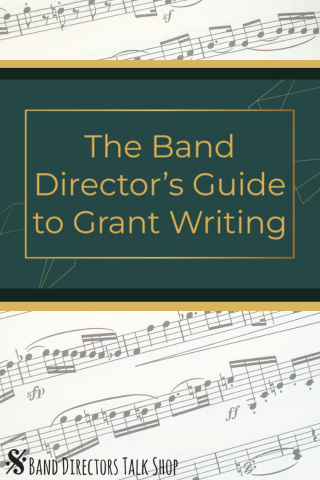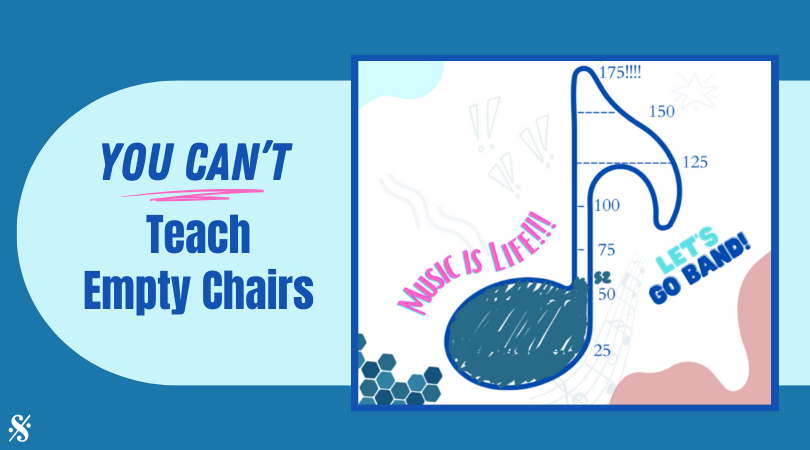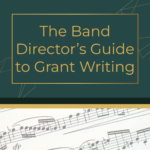Writing a successful grant proposal is an essential skill for band directors seeking to help fund their programs. Grant writing doesn’t have to be intimidating, and it is far from scary when you know what to do.

Getting Started
When thinking about writing grants, decide first what you need, how much will it cost, and where you buy it. If your grant includes buying something, make sure that you get a quote from a qualified representative, and not just website prices. Make sure that the quote will be good for at least six months, with no special sales or deals included, and double-check to ensure that you can buy your grant items from a school-approved vendor.
Is your grant request large? If so, you may want to consider breaking it down and applying for matching grants with several organizations. You will also need to have a plan in place if only a portion of your grant is awarded.
Project Title
The project title is one of the most important parts of grant writing because it is the first thing that gets seen about your grant request. The following tips will help you create a great title:
- Use plain language
- Try to keep the title short and avoid unnecessary words
- Use active, forward thinking verbs
- Avoid being generic
- Do not use punctuation and abbreviations
Gather Information
Gathering information is the most time-consuming part of grant writing. Most grants ask for a lot of information about all aspects of your organization, school district, and finances. Every grant is different and will want different information, so gather as much information at the beginning in order to save time. Make sure that you are thorough and double-check all of your information.
Once all of the information is written and gathered, the grant writing process will simply be a matter of filling in the blanks. You can save this information for future reference and be able to complete the grant-writing process quickly and efficiently when writing future grants.
Finding Grants
Finding grants can be the most difficult and frustrating aspect of grant writing. Good grants can sometimes be hard to find, so ask for help. Have any of your colleagues written a successful grant? Does your administration know where to find possible funding? Do you know of anyone who has received funding in a neighboring district? Always ask first!
Searching the internet will yield you the most information, especially when using keywords for your geographical area and types of funding that you are looking for (fine arts, STEM, etc.). Large banking corporations have grant databases that house hundreds of types of grants in one location. Search local and national bank websites to see what types of grants are available in your area.
Writing the Grant
When you write your grant, make sure to save all of your work in a separate document so you can reference it later and possibly use it for future grants. If you struggle with writing, find writing examples, or use AI to help guide your writing, but do not copy anything verbatim. Most importantly, do not write yourself into a corner with your grant – be aware of what happens to your grant items/money after you receive it. You will not be able to take your grant items with you if you ever leave your school or district.
Proofread
Always proofread anything that you submit. Have a colleague, friend, or administrator proof to make sure your work makes sense. It doesn’t hurt to give this to as many people as possible to ensure that it is written correctly. Double-check phone numbers, emails, and all contact information when proofreading as well, so that the grant committee has your most up-to-date contact information. Also, be aware of all due dates! Don’t rush to get something done and turn in something that is not your best effort. Many grants have two yearly deadlines.
Receiving a Grant
You won’t get every grant you apply for, but once you do get one, make sure you follow your district and grant guidelines on how to spend the money. Every district is different, so double-check with your district CFO or campus secretary about what to do next. If the grant is a check, it will probably need to be turned in to your school business office – even if it has your name on it! Follow your district’s purchasing guidelines when spending the grant money, and make sure you spend the funds only on your grant items.
What Happens Next?
Receiving a grant is a big accomplishment, so make sure that you share this information with your supervisors and administrators. Acknowledge those foundations and companies who gave you money publicly via social media or through a local news source, and make sure that you show your grant money in action.
After receiving a grant, make sure that you follow up after the funds are spent. Most foundations will ask for an accounting of how you spent the funds. They will usually give you a specific timeline and a form to complete. All grants are different, but make sure that you fulfill all of your obligations so that you will be eligible for a grant from them in the future.
Now, do it Again!
The secret to grant writing success is writing as many grants as possible. The more grants you submit, the better the odds will be that you will be awarded a grant. Also, be patient! Some grants will take up to a year to be awarded and you will not be aware that you were awarded the grant until the check arrives in the mail.
Taking the time to learn to find and write grants can positively impact our band programs for years to come! I wish you the best of luck as you embark on your grant writing journey!
Melinda Najera is the Director of Bands at Piner Middle School in Sherman, Texas. She has presented on grant writing at TMEA and the Midwest Clinic and has written more than $50,000 worth of grants in her four years in Sherman ISD. She is determined to help everyone become successful grant writers and help them get the funding they need for their programs! She received her Bachelor’s in Music from the University of Texas at Arlington and her Master’s in Music Education from Texas Woman’s University.
Related Reading:
How to Find Grants for Your Band
How We Got $3000 in Chamber Music for Free (The 64 Gig Challenge)
Starting From Zero: Building a Music Program
If you would like to receive our weekly newsletter, sign up here.
Don’t forget to like us on Facebook too!
Learn. Share. Inspire.
BandDirectorsTalkShop.com






Leave a Reply
You must be logged in to post a comment.